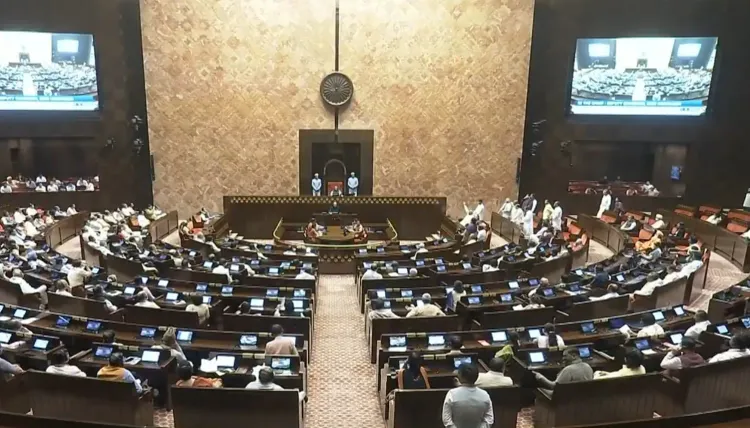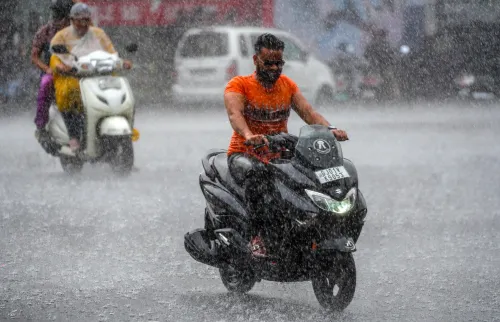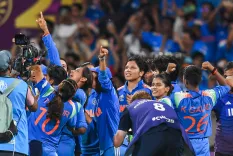Why Did the Rajya Sabha Erupt Over CISF Deployment?

Synopsis
Key Takeaways
- Rajya Sabha adjourned due to political discord.
- Opposition raised concerns over CISF personnel presence.
- Deputy Chairman clarified personnel were marshals, not CISF.
- Rule 267 invoked for urgent matters, requiring strict adherence.
- Calls for maintaining parliamentary decorum continue amidst protests.
New Delhi, Aug 5 (NationPress) The Rajya Sabha was suspended until 2 p.m. on Tuesday after a tumultuous morning session marked by intense exchanges between government and Opposition members regarding the deployment of CISF (Central Industrial Security Forces) personnel in the Well of the House last week.
The immediate catalyst was the Opposition's assertion that CISF personnel had infiltrated the Well of the House amid protests — a claim that was vehemently denied by the Chair and the government.
The Monsoon Session, already plagued by ongoing adjournments, remains entrenched in procedural deadlock and political discord.
The session began on Tuesday with tributes, including one for former MP Praveen Naik of Gujarat. Deputy Chairman Harivansh oversaw the proceedings, which rapidly devolved into disarray.
Leader of the Opposition Mallikarjun Kharge voiced strong objections to what he termed the “influx” of CISF personnel during Opposition demonstrations, labeling it “deeply objectionable” and a breach of democratic principles.
“Our parliamentary staff is qualified and adequate to ensure our safety,” Kharge insisted, demanding that such deployments not be repeated. Kharge previously penned a letter to the Deputy Chairman expressing his concerns, which he also shared with the media.
Deputy Chairman Harivansh expressed dissatisfaction over the public dissemination of the letter, asserting that such communications are privileged. Kharge defended his actions, claiming that informing each member individually was impractical and reiterated that the presence of CISF personnel was unprecedented.
The Chair clarified that the personnel in question were “marshals from the Parliamentary Security Service, not CISF.”
Recalling historical context, the Deputy Chairman reminded the House that the security framework was established by Vithalbhai Patel, the first Indian President of the Central Legislative Assembly. He condemned Opposition members for breaching Rules 235 and 238, referring to recent instances when MPs allegedly disrupted a minister’s suo motu statement and attempted to silence another member’s microphone.
In a dramatic exchange, Kharge queried whether the House was governed by the Chair or by Home Minister Amit Shah, prompting a sharp rebuttal from the Deputy Chairman, who deemed the allegation “baseless and inappropriate.”
Leader of the House J.P. Nadda intervened with a pointed remark: “Take lessons from me — I’ve been in politics for four decades. There are numerous ways to disrupt proceedings, but the Chair’s comments today are historic and will serve as future reference.”
Nadda accused the Opposition of engaging in “anarchism” and undermining the dignity of the House.
Parliamentary Affairs Minister Kiren Rijiju joined the fray, accusing Kharge of misleading the House. “They were marshals, not CISF personnel,” Rijiju stated, asserting that the Opposition’s assertions were factually incorrect and harmful to the institution’s integrity.
The Deputy Chairman also revealed that 34 notices had been submitted under Rule 267, which permits the suspension of scheduled business to address urgent issues.
He noted that most notices did not adhere to procedural norms and reiterated that Rule 267 should only be invoked in “the rarest of rare” situations. He lamented that the rejection of such notices often led to deliberate disruptions.
The Deputy Chairman also cited past instances of disorder, including Opposition members snatching papers from ministers and throwing them into the Well — actions that, he warned, could constitute a breach of privilege.
He urged members to honor the sanctity of the House and exercise their democratic rights from their designated seats.
Quoting former Prime Minister Jawaharlal Nehru, the Deputy Chairman reminded members of their obligation to uphold the dignity of Parliament.
“Parliament serves as a model for the rest of the country. How we conduct ourselves here influences behavior elsewhere — whether in State Legislatures or in other self-governing bodies, right down to the grassroots of our democracy — the Panchayats in villages... Therefore, we all bear this significant responsibility — to behave as we ought to and remember that countless eyes are upon us, and we must not do anything that tarnishes Parliament or sets a poor example before the public.”
Despite repeated calls for restraint, sloganeering persisted, necessitating the adjournment.
With crucial legislative work still pending, the Monsoon Session remains in a stalemate. The Opposition continues its protests, while the government insists on upholding procedural standards.









